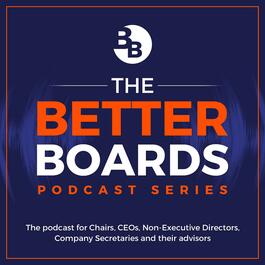
Can AI make better business decisions? | Professor Katja Langenbucher, Goethe University, Frankfurt
Send us a text In this episode of the Better Boards Podcast, Professor Katja Langenbucher explores how boards can embrace AI to future-proof their decision-making. Dr. Sabine Dembkowski speaks with Katja, a law professor at Goethe University in Frankfurt and affiliated with SciencesPo, Paris. She serves on the supervisory boards of BaFin and IEP, bringing extensive boardroom and academic experience. AI is rapidly reshaping industries—from pharmaceuticals to finance—and boards can no longer afford to stand still. Katja outlines why boards must move past hesitation and actively integrate AI into their processes. She explains how leading organisations embed AI into strategy, what this means under the business judgment rule, and why AI should challenge—not replace—human insight. AI isn’t a Trend—It’s Becoming a Legal Expectationisn’t a Trend—It’s becoming a Legal expectation. AI AI may still seem opaque to some directors, but that view is increasingly out of step with governance expectations. In jurisdictions applying the business judgment rule, directors must demonstrate informed, reasonable decision-making. AI is becoming part of that expectation. “Very soon, you cannot claim to be well-informed without consulting an AI.” Boards have long leaned on expert input for board evaluations and strategic oversight. Going forward, AI must be part of that toolkit—or boards risk falling short of legal standards. From Coffee Chains to Capital Markets: The Real-World Power of AI Katja cites practical use cases—like how Starbucks applies AI to optimise store locations using behavioural, geographic, and competitor data. “You can use AI to identify an M&A target, spot a hostile takeover risk, or even test how markets might respond to your messaging.” Yet, she observes that AI is still rarely referenced in board evaluations or agendas, despite its ability to surface risks, run scenario models, and sharpen decision-making. The New Role of Company Secretaries Company secretaries are ideally placed to help boards adopt AI meaningfully. Katja is clear: directors don’t need to code—they need to ask better questions. “Nobody is asking directors to code—but boards must ask the right questions.” Challenging Groupthink and Elevating Debate Groupthink continues to undermine board effectiveness. Katja shares a compelling example of using AI to simulate press responses—ranging from neutral to harsh—on a sensitive issue. “Seeing a mock ‘nasty article’ on the big screen challenged the entire board’s thinking.” AI as Induction, Humans as Interpretation AI and human judgment are not competing forces—they are complementary. AI finds patterns. Humans interpret them. “A good strategic decision is always a combination of AI and human thinking.” Three Key TakeawaysDon’t Be Late to the Party - AI is fast becoming a market standard. Boards that delay their adoption risk strategic, legal, and reputational disadvantage.Blend AI with Human Judgment - Strategic decisions should integrate the pattern-finding power of AI with the contextual understanding of directors.Use the AI That Suits Your Board - Every corporation has a unique data pool Remember to subscribe and never miss an episode of the Better Boards Podcast Series. It’s available on Apple, Spotify, or Google. To find out how you can participate in the Better Boards Podcast Series or for more information on Better Boards’ solutions, please email us at info@better-boards.com.
From "The Better Boards Podcast Series"


Comments
Add comment Feedback